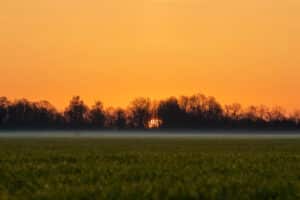As a real estate broker in Georgia, I’ve sold land all over the state. And everywhere I go these days, I always seem to get asked the same question, “How’s the land market?” That is the hardest question to answer for a broker who sells investment property. Do you say the market is not doing well and prices are declining, which will probably result in losing a sell? Or do you tell them land seems to be stable and will likely not take the same dive that the residential market took? The only way I can answer this question is to break rural land into three categories: timberland, hunting land, and farmland. After reading my opinions on each, you the buyer, can make your own decisions.
Timberland
By timberland, I am referring to land with planted pine or hardwood stands of timber that are purchased for the sole purpose of harvesting timber. Timberland is usually purchased by putting a value on the dirt and then adding the value of the timber to come up with a purchase price. In Georgia, we saw timberland investors paying as high as $1,200 per acre for dirt as recent as 2007. Today’s market is very different. It seems the only buyers for timberland are TIMOs (Timber Investment Management Organization) or pension funds. These investors are looking to pay no more than $500 to $700 per acre for dirt, which is a substantial decrease in value from the height of the market in 2006. One could make the argument that these types of buyers are only bottom feeding and using their cash position to take advantage of the market. My argument is if the TIMOs and pension funds are the only ones in the market that are looking to by large tracts of timberland for investment, then the price they are willing to pay is the market.
So what do I tell my clients about timberland? The timberland market has not only been hurt by the collapse of the construction industry, but it has also been hit hard by other countries importing quality lumber into the U.S. The timber market will eventually come back. And even though it seems like the industry is in the tank and there is no cure in the near future, timber prices won’t stay depressed forever. I do caution my clients on what they should be willing to pay for dirt, as I think we’ll see a rebound in timber long before we see dirt on the rise again. If you’re interested in buying timberland, just look at its history. Timberland seems to have its ups and downs, but more times than not it has turned out to be a good investment for diversifying your portfolio – assuming you have staying power.
Recreational Property
Recreational property is property which is purchased for the use of hunting, fishing, riding, or some other type of enjoyment. Perhaps the hardest hit market in the land industry today, this type of property became very popular during the real estate boom. Most people lost site of the investment aspect of land and began to pay anywhere from $3,500 to as much as $6,000 per acre for quality hunting and recreational tracts. Most of the people who purchased them will make the argument that the properties were improved; therefore, they can justify the price they paid. With the turn in the economy, many buyers now think these properties were over improved. What’s the use of having a 10,000 sqft lodge for a family who just wants to hunt, and how much is it going to cost to keep the place up? These are questions buyers are now asking themselves.
What do I tell buyers that call me looking for recreational property? My advice is to make sure the property you are buying is something that you will be happy with for a minimum of 10 years, and be very careful on how much of a premium you are willing to pay for improvements that do not produce income. Buyers also have to accept the fact that there is a good chance they will see comparable properties sell for less than what they paid as the industry works through finding the new value of recreational property.
Farmland
The third and final category is farmland. Irrigated farmland has declined some in value, but not as much as timberland and recreational land. This is due to high commodity prices, the income that farmland generates for its owners. Will commodity prices hold? Who knows. Will the current administration do away with farm subsidies? These are major factors in determining the value of farmland.
Farmland could turn out to be a great investment for those who have purchased it based on a percentage of income vs. purchase price. Though farmland has its risks and the returns are usually only around 4% to 6%, it has proven to be a safe bet for those who are looking for yearly income and a hard asset that will not disappear like some stocks have over the past few years. Farmland will probably continue to decrease slightly in price, but if you find property you like, are happy with the income it produces, and you want to buy land, then farmland seems to be as safe as any other investment in this mess of an economy.
When buying land in today’s market, the best advice that I can offer is to use common sense and some basic math, and have long term staying power. The days of flipping land are gone for awhile. Feel good about what you are doing. No one will know when we are at the bottom until the bottom is six months to a year behind us. Invest wisely and do your due diligence before you buy.
This content may not be used or reproduced in any manner whatsoever, in part or in whole, without written permission of LANDTHINK. Use of this content without permission is a violation of federal copyright law. The articles, posts, comments, opinions and information provided by LANDTHINK are for informational and research purposes only and DOES NOT substitute or coincide with the advice of an attorney, accountant, real estate broker or any other licensed real estate professional. LANDTHINK strongly advises visitors and readers to seek their own professional guidance and advice related to buying, investing in or selling real estate.









thanks for the insight.
Am looking for land and willing to hold on and out.
Any of the three types suit my objective.
Tate I really enjoyed your land market article. You are so write about the 3 different types of land and 3 types of buyer’s. I am Broker for Tecomate Properties and we have several buyer inquiries each week. Educating our clients is the key to our success. I look forward to working with you in the future.
Very interesting perspective. I am curious about your thoughts on farmland, timberland or recreational land for the timing and potential of “residential” development.